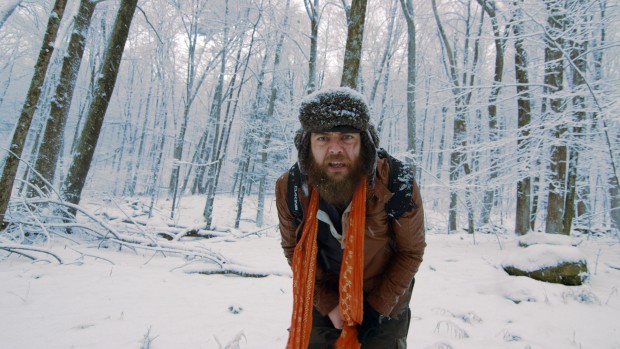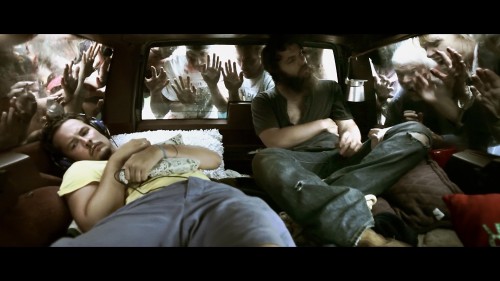 Back to selection
Back to selection
Cracking Eggs: Looking for Financial Stability Outside of Independent Film
 Tex Montana Will Survive!
Tex Montana Will Survive! Though Elijah Wood beat us in the Moon Pie eating contest (five pies in two minutes), we took home the prize for best feature. We’d just premiered our second film, Tex Montana Will Survive!, at the Chattanooga Film Festival, where we stood in the hallway — too nervous to sit within the crowd — waiting to hear if anyone would actually laugh. The first joke lands with an uproar they could probably hear over the bombast of Furious 7 in the theater adjacent. Our fears were thankfully unfounded. Tex Montana was as funny as we thought it was… and we now had our second award-winning film.
So it was time to go home and spend eight months shooting photographs of pot roast, cheesecake, and all of the other dishes I’ve shot a hundred times before.
I am an independent filmmaker, so that means that I am also something else — meaning, I must do something else to pay the bills and keep myself afloat as I sink more and more of my time into movies that fewer people are willing to pay for. So I am an independent filmmaker, but I’m a far more successful food photographer and cookbook author. And if you want to make it in film, you may need to crack a few eggs.

My partner in film, Jeremy Gardner, came to me nearly six years ago with a script for an intimate zombie movie called The Battery. I was working around the clock on half a dozen cookbooks a year, but I already had a lot of the equipment that would be needed to make an indie film at my disposal. Lighting, lenses, and most importantly, the Canon 5D Mark II. In between using the camera to capture the perfect pancake photo, I’d played around with the amazing video functions that were changing the cost of entry for indie filmmakers everywhere. So I naively proclaimed that I could shoot Jeremy’s movie, seeing cinematography as merely an extension of photography.
Without a steady freelance career, I would’ve never been able to afford to schedule the time off to shoot that first feature. Though it was only a 16-day shoot, the days off from waiting tables eventually overdrafted Jeremy’s bank account, and the last thing you need is your director and lead actor worried about which of their bills aren’t getting paid on the last few days of principal photography.
With only a $6,000 budget that we’d scraped together from friends, the whole production and everybody working on it was juggling funds by the end. We could only afford food on the last days because the $600 Volvo station wagon that was prominently featured throughout the movie blew its engine and we were able to sell it for $400 to a scrapyard on that same day. That scrapped Volvo was destined to become Jeremy’s car after the shoot, and he is still without a vehicle five years later. Meanwhile, I was sitting somewhat pretty, with at least something in a savings account.
But that would change when we hit post-production, promotion, the festival tour, and eventually distribution. Even though I’d managed to find the time to co-author and photograph a cookbook called Great Food Fast in only the short window between principal photography and reshoots on the film — and even though that book went on to become a New York Times bestseller — finishing and promoting The Battery would eventually burn my cookbook career to the ground.
It took at least two years to finish and release The Battery. For me to (try to) fix all of the amateur cinematography mistakes I’d made after jumping into filmmaking so quickly, for me to learn and execute the sound design because we couldn’t afford to hire a professional, for me to eventually promote the film on some legs of the 50-plus festival tour… It ate up all of my time. The promise of something glitzy (film) had me ignoring my original career.
At the same time, I was amassing newer, better film equipment on credit cards. Things I didn’t have the luxury of using on that first film. Even simple things like a fluid head tripod, follow focus, and cheap Steadicam. But more expensive things as well, like a dedicated cinema camera, the Canon C100.
I’d blown through my savings, racked up credit card debt, and never even stopped to notice that all of that time I was putting into film — all of the cookbook jobs I was passing on to tweak color and sound — had caused all of my loyal clients to look elsewhere for food photography. I was now an award-winning filmmaker, but I’d toasted my bread and butter.
There’s a large focus on budgets with indie filmmaking, how this was made for only this much, but movies are a time-suck more than anything. Under a certain budget, your effort is costing you far more than anything else. You don’t clock into the editing software, or ProTools, or DaVinci Resolve, but the hours (or in many cases, months) you spend inside of those programs add up. The time you spend delivering to film festivals, and then hopefully attending those film festivals… It isn’t insignificant. And it isn’t guaranteed to bring you a return. The likelihood of a return that is anywhere near as significant as the time you put in is not in your favor.
We don’t know a single filmmaker who makes their living solely off of their films, but the most prolific filmmakers, tend to be the ones who have a freelance skill that is in demand and within a discipline that is entirely flexible. The most obvious skills are directly related to film — cinematography, editing, commercial work — but those jobs are getting far more competitive, with ever-diminishing pay, as budgets go down and more and more filmmakers enter the job market. The Battery was eventually distributed in over 20 countries, topped a ton of best-of lists, but we still couldn’t afford to hire these types of professionals on our second film.
I feel it is best to branch out. Hedge your bets with the stability of a career that may not be glitzy but is less cutthroat than film. You can wait around for a filmmaker to hire you as cinematographer once or twice a year, or you can start doing videography for weddings, which is a nightmare, but (with filmmaking experience) you’re likely to have the best production values in town and you’re likely to get paid nearly the same for one wedding as you would an entire micro-budget film.
A flexible career outside of film may be the best foundation to assure that your films can ever get made. Most people can scrape together enough time, money, and favors to make their first film, but you’ll need stability to make the second, third, and so on. Even with relative successes like The Battery, you’re unlikely to find that financial stability from the films themselves. If you’re like me, you’ll work for two years and eventually make enough to pay your rent for a month or two.
People always ask us how we made a film for only $6,000, but anyone can make a film for that little as long as they have enough time away from work to watch days and days of online tutorials and then do all of the post-production work themselves.

After the premiere of Tex Montana Will Survive! in Chattanooga, I spent the rest of last year building my cookbook career back from the ground up. All we wanted to do was release our new movie into the world, but all I wanted was the stability to release it without going broke. I co-authored and photographed two new books that were both released last month. That gave me the time to finally go back and finalize the movie’s color and sound, as well as to shoot a whole new opening sequence.
So as my savings bleed dry once again, we’ve embarked on an experimental Kickstarter campaign to fund a Creative Commons release of Tex Montana Will Survive! Instead of asking for pledges to raise a budget, we’ve already made the film and spent all of that time. If we hit our goal, we will release the film for free, to everyone, whether they’ve pledged or not. We will upload it to YouTube, Vimeo, and even to the torrent sites that devastated us during the release of our last movie. Then we will use the money we’ve raised to take even more time away from our jobs to make another film. Because, I’d much rather be shooting a movie than yet another bowl of macaroni and cheese.
You can pledge to the Tex Montana Will Survive! Kickstarter campaign at www.texmontana.com.
Christian Stella is the co-director and cinematographer of Tex Montana Will Survive! He was also responsible for co-editing, sound recording, sound design, color correction, score recording and score mixing on the film. He filled many of these same roles on Jeremy Gardner’s directorial debut The Battery.
